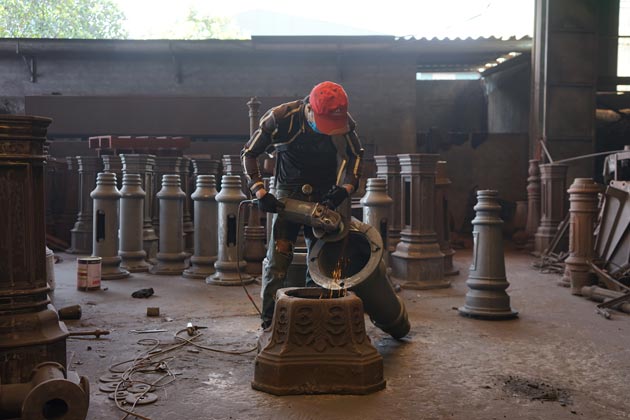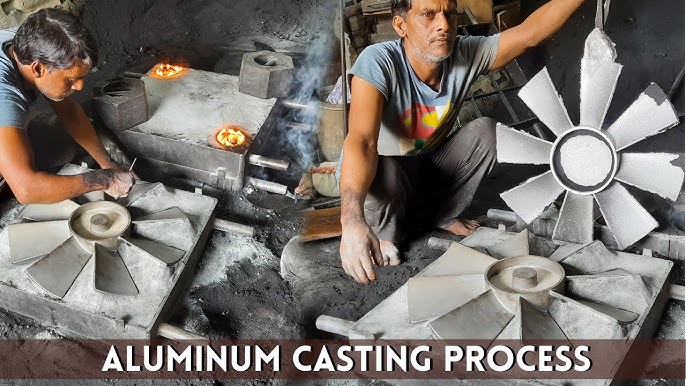Understanding the Perks and Innovations in the Aluminum Foundry Market
The Aluminum Foundry market plays an important duty in modern production. Its light-weight residential properties notably improve fuel effectiveness, especially in auto and aerospace fields. On top of that, Aluminum's resistance to corrosion guarantees longevity in various applications. As the industry evolves, innovations such as advanced recycling and additive manufacturing are reshaping production approaches. Exploring these advancements reveals not only the advantages yet additionally the challenges ahead for Aluminum shops in a swiftly altering market.
The Lightweight Advantage of Aluminum
Aluminum's lightweight nature supplies substantial advantages throughout numerous markets, especially in manufacturing and transport. Its reduced density enables the manufacturing of parts that are less complicated to take care of and set up, causing minimized labor expenses and enhanced performance. In the auto market, lighter lorries add to boosted fuel economic climate and lower exhausts, lining up with global sustainability objectives. In aerospace, the usage of Aluminum decreases the total weight of aircraft, which is critical for boosting performance and minimizing functional costs.
In addition, Aluminum's lightweight residential properties help with innovative styles that were formerly impractical with heavier products. This versatility enables makers to develop complicated forms and frameworks while preserving structural honesty. Overall, the light-weight benefit of Aluminum not just enhances product efficiency yet also drives innovations in technology and style, making it a favored product in numerous applications.
Corrosion Resistance and Longevity
The Aluminum Foundry market is renowned for creating products with premium corrosion resistance, making them perfect for different applications. This residential or commercial property, integrated with improved architectural stability, adds to the durable efficiency advantages that Aluminum parts supply. Because of this, sectors increasingly count on Aluminum to meet requiring ecological problems without endangering top quality.
Superior Corrosion Resistance
While various metals deal with substantial difficulties from environmental aspects, Aluminum sticks out for its premium deterioration resistance, making it a recommended selection in several applications. This residential or commercial property is mainly because of a natural oxide layer that develops on the Aluminum surface, offering a barrier versus dampness and harsh agents. Unlike various other metals that may corrosion or break down in time, Aluminum maintains its honesty also in extreme settings, such as coastal locations or commercial settings. In addition, its light-weight nature incorporated with rust resistance makes it suitable for applications in aerospace, automobile, and aquatic industries. In general, Aluminum's exceptional toughness not only enhances item longevity yet also lowers maintenance costs, providing a compelling benefit for consumers and manufacturers alike.
Enhanced Architectural Stability
Engineers and developers progressively recognize the importance of enhanced architectural stability in contemporary applications, where both corrosion resistance and sturdiness are vital. Aluminum alloys, recognized for their lightweight buildings, also display remarkable resistance to corrosion, making them appropriate for harsh atmospheres. The innovative methods used in the Aluminum Foundry industry contribute substantially to producing elements with boosted durability. Advanced casting processes and alloy make-ups are customized to meet certain efficiency requirements, making sure that frameworks can withstand extreme problems without compromising honesty. In addition, surface treatments and finishes improve the life expectancy of Aluminum items, better mitigating damage over time. This concentrate on boosted architectural honesty not only prolongs the functionality of materials however also decreases maintenance costs, solidifying Aluminum's position as a product of selection in numerous sectors.
Long-lasting Performance Perks
Durable performance in Aluminum parts is mostly credited to their premium rust resistance and durability. Unlike several steels, Aluminum naturally forms a safety oxide layer, which protects against corrosion and damage in numerous environments, including industrial and aquatic settings. This fundamental property significantly expands the lifespan of Aluminum products, reducing maintenance and replacement expenses. In addition, the light-weight nature of Aluminum enhances its applicability throughout markets without compromising stamina. The material's resistance to use and tear also adds to its dependability popular applications, making it a perfect selection for vehicle, aerospace, and construction fields. As markets progressively prioritize sustainability and long life, Aluminum's performance benefits line up with modern design requirements, solidifying its function in ingenious production procedures.
Ecological Effect and Sustainability
 As the Aluminum Foundry market evolves, it progressively focuses on environmental impact and sustainability, recognizing the requirement for responsible practices when faced with environment adjustment. Initiatives to minimize waste and energy consumption are at the forefront, with several factories taking on recycling initiatives to reclaim Aluminum scrap. This not just lowers basic material usage however likewise especially reduces power expense, as recycled Aluminum calls for just a portion of the power contrasted to primary production.
As the Aluminum Foundry market evolves, it progressively focuses on environmental impact and sustainability, recognizing the requirement for responsible practices when faced with environment adjustment. Initiatives to minimize waste and energy consumption are at the forefront, with several factories taking on recycling initiatives to reclaim Aluminum scrap. This not just lowers basic material usage however likewise especially reduces power expense, as recycled Aluminum calls for just a portion of the power contrasted to primary production.Furthermore, improvements in exhausts regulate innovations are being carried out to reduce air toxins, straightening operations with stricter environmental policies. Shops are additionally checking out alternative power resources, such as solar and wind, to power their facilities sustainably. By fostering cooperation with stakeholders, the industry intends to develop cutting-edge options that enhance eco-friendly stewardship. Collectively, these efforts highlight a commitment to reducing the Aluminum Foundry's carbon impact while promoting a circular economy within the production field.
Advanced Manufacturing Techniques
 Revolutionizing manufacturing processes, the Aluminum Foundry industry is increasingly incorporating advanced production techniques to improve efficiency and accuracy. Techniques such as computer numerical control (CNC) machining and additive production have arised as vital components in maximizing production operations. CNC machining permits for high-precision element manufacture, considerably reducing product waste and production time. On the other hand, additive production opens up brand-new avenues for complicated geometries and lightweight styles that were previously hard to achieve.
Revolutionizing manufacturing processes, the Aluminum Foundry industry is increasingly incorporating advanced production techniques to improve efficiency and accuracy. Techniques such as computer numerical control (CNC) machining and additive production have arised as vital components in maximizing production operations. CNC machining permits for high-precision element manufacture, considerably reducing product waste and production time. On the other hand, additive production opens up brand-new avenues for complicated geometries and lightweight styles that were previously hard to achieve.Additionally, the deployment of automation and robotics in Aluminum factories streamlines operations, lessens human mistake, and improves worker security. These Web Site innovations promote a more responsive production environment, allowing producers to adapt quickly to market needs. The assimilation of advanced simulation software even more improves the style and screening stages, causing premium item top quality. Jointly, these strategies not just boost functional performance yet additionally foster technology, placing the Aluminum Foundry sector at the center of modern-day production.
Innovations in Recycling Processes
The Aluminum Foundry market is not only advancing in manufacturing strategies yet is likewise making significant strides in recycling procedures. Technologies are arising to improve the efficiency of recycling approaches, minimizing energy consumption and boosting sustainability. Advanced sorting technologies, such as computerized optical sorting, allow the identification and splitting up of Aluminum from other materials with high precision. This results in a greater high quality of recycled Aluminum, which is crucial for keeping the stability of the final items.
Closed-loop recycling systems are being executed, allowing makers to reuse Aluminum scrap within their very own production processes. This reduces waste and promotes a round economic situation. Additionally, study into brand-new recycling strategies, such as hydrometallurgical processes, uses the potential for recuperating Aluminum from intricate waste streams. These developments not just add to decreasing the carbon impact of the Aluminum Foundry industry however additionally bolster its economic feasibility in an increasingly ecologically aware market.
Applications Throughout Various Industries
Many sectors are increasingly acknowledging the convenience and benefits of Aluminum Foundry items, bring about widespread applications across markets such as auto, consumer, aerospace, and building products. In the auto market, Aluminum castings visit add to light-weight lorry layouts, enhancing fuel effectiveness and performance. Aerospace makers use Aluminum parts for their strength-to-weight ratio, necessary for aircraft frameworks and parts.
In building and construction, Aluminum is preferred for its resilience and resistance to corrosion, making it perfect for window frames, roofing, and architectural assistances. Durable goods likewise take advantage of Aluminum Foundry products, as seen in kitchenware, electronics, and packaging, where lightweight and recyclable materials are important.
The adaptability of Aluminum Foundry methods permits precise specifications and elaborate styles, catering to the varied demands of these sectors. Because of this, Aluminum Foundry items are ending up being important to contemporary manufacturing processes throughout different sectors.
Future Fads in Aluminum Foundries
As markets continue to develop, Aluminum foundries are positioned to welcome a number of essential trends that promise to boost effectiveness and sustainability. One popular trend is the raising fostering of digital technologies, consisting of automation and expert system, which improve procedures and enhance high quality control. Furthermore, the press in the direction of sustainable practices is leading shops to spend in recycling technologies, greatly decreasing waste and power usage.
 Another arising fad is using sophisticated alloys and products, satisfying the growing demand for light-weight and durable click this parts throughout various markets (Aluminum Foundry). In addition, the integration of additive manufacturing strategies is anticipated to transform component layout, offering personalization and minimizing preparations
Another arising fad is using sophisticated alloys and products, satisfying the growing demand for light-weight and durable click this parts throughout various markets (Aluminum Foundry). In addition, the integration of additive manufacturing strategies is anticipated to transform component layout, offering personalization and minimizing preparationsCooperation with research institutions is also expected to drive innovation, as foundries seek to develop brand-new procedures and products. Aluminum Foundry. Jointly, these patterns suggest a transformative future for the Aluminum Foundry market, straightening with wider goals of sustainability and efficiency
Frequently Asked Questions
What Are the Typical Costs Connected With Aluminum Foundry Manufacturing?
The regular prices connected with Aluminum Foundry production include resources, labor, energy, equipment maintenance, and overhead expenses. These factors collectively affect the total economic investment needed for reliable Aluminum casting procedures.
How Does Aluminum Compare to Other Steels in Toughness?
Aluminum, while lighter than numerous steels, exhibits outstanding strength-to-weight proportions. Compared to steel, Aluminum is less strong yet offers superb rust resistance, making it a favorable option in applications where weight and toughness are essential.
What Safety and security Procedures Remain In Place in Aluminum Foundries?
Safety steps in Aluminum shops commonly consist of obligatory individual protective devices, air flow systems to control fumes, normal tools maintenance, training programs for staff members, and adherence to stringent safety policies to minimize dangers connected with liquified metal handling.
How Is Quality Control Managed in Aluminum Spreading Processes?
Quality control in Aluminum spreading procedures entails extensive inspections at various phases, including basic material evaluation, process monitoring, and end product screening. Strategies such as statistical procedure control and non-destructive testing warranty adherence to industry standards.
What Accreditations Are Necessary for Aluminum Foundry Vendors?
The relevance of accreditations for Aluminum Foundry distributors consists of ISO 9001 for high quality management, ISO 14001 for ecological management, and industry-specific requirements like ASTM and SAE, guaranteeing compliance, safety and security, and reliability in producing procedures.
The Aluminum Foundry market plays a necessary duty in contemporary manufacturing. The Aluminum Foundry industry is renowned for producing materials with remarkable deterioration resistance, making them ideal for different applications. Revolutionizing production processes, the Aluminum Foundry industry is increasingly incorporating innovative manufacturing techniques to enhance effectiveness and accuracy. The Aluminum Foundry sector is not just progressing in making strategies but is likewise making considerable strides in recycling processes. As industries continue to progress, Aluminum shops are positioned to accept a number of vital fads that assure to boost performance and sustainability.